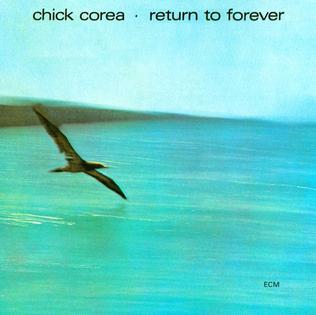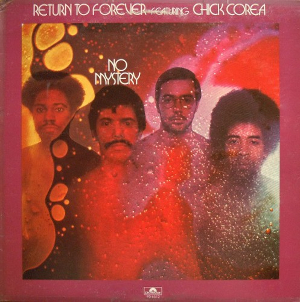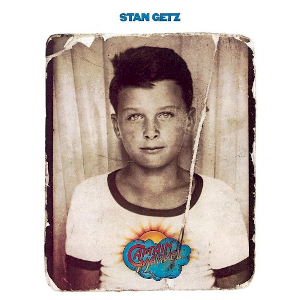
Stanley Clarke is an American bassist, composer and founding member of Return to Forever, one of the first jazz fusion bands. Clarke gave the bass guitar a prominence it lacked in jazz-related music. He is the first jazz-fusion bassist to headline tours, sell out shows worldwide and have recordings reach gold status.

Armando Anthony "Chick" Corea was an American jazz composer, pianist, keyboardist, bandleader, and occasional percussionist. His compositions "Spain", "500 Miles High", "La Fiesta", "Armando's Rhumba", and "Windows" are widely considered jazz standards. As a member of Miles Davis's band in the late 1960s, he participated in the birth of jazz fusion. In the 1970s he formed Return to Forever. Along with McCoy Tyner, Herbie Hancock, and Keith Jarrett, Corea is considered to have been one of the foremost jazz pianists of the post-John Coltrane era.
"Spain" is an instrumental jazz fusion composition by jazz pianist and composer Chick Corea. It is likely Corea's most recognized piece, and is considered a jazz standard.

Return to Forever was an American jazz fusion band that was founded by pianist Chick Corea in 1972. The band has had many members, with the only consistent bandmate of Corea's being bassist Stanley Clarke. Along with Weather Report, The Headhunters, and Mahavishnu Orchestra, Return to Forever is often cited as one of the core groups of the jazz-fusion movement of the 1970s. Several musicians, including Clarke, Flora Purim, Airto Moreira and Al Di Meola, came to prominence through their performances on Return to Forever albums.

Flora Purim is a Brazilian jazz singer known primarily for her work in the jazz fusion style. She became prominent for her part in Return to Forever with Chick Corea and Stanley Clarke. She has recorded and performed with numerous artists, including Dizzy Gillespie, Gil Evans, Opa, Stan Getz, George Duke, Mickey Hart of the Grateful Dead, Santana, Jaco Pastorius, and her husband Airto Moreira.

Return to Forever is a jazz fusion album by Chick Corea, simultaneously functioning as the debut album by the band of the same name. Unlike later albums by the group, it was released by the ECM label and produced by Manfred Eicher. The album was not released in the USA until 1975. The record is often considered one of the classic albums in electric jazz.

Joseph Carl Firrantello, known as Joe Farrell, was an American jazz multi-instrumentalist who primarily performed as a saxophonist and flutist. He is best known for a series of albums under his own name on the CTI record label and for playing in the initial incarnation of Chick Corea's Return to Forever.

Airto Guimorvan Moreira is a Brazilian jazz drummer and percussionist. He is married to jazz singer Flora Purim, and their daughter Diana Moreira is also a singer. Coming to prominence in the late 1960s as a member of the Brazilian ensemble Quarteto Novo, he moved to the United States and worked in jazz fusion with Miles Davis and Return to Forever.

Hymn of the Seventh Galaxy is the third studio album by American jazz fusion band Return to Forever. It was released in October 1973 by Polydor. Flora Purim, Joe Farrell, and Airto Moreira were replaced by drummer Lenny White and guitarist Bill Connors. It would be the only album with Bill Connors as guitarist; he left after its release and was replaced by Al Di Meola.

No Mystery (1975) is the fifth studio album by jazz-rock fusion band Return to Forever.

Light as a Feather is the second studio album by jazz fusion band Return to Forever led by pianist Chick Corea.

Children of Forever is the debut album by jazz fusion bassist Stanley Clarke. It was recorded in December 1972, and was released in 1973 by Polydor Records. On the album, Clarke is joined by vocalists Dee Dee Bridgewater and Andy Bey, flutist Arthur Webb, guitarist Pat Martino, keyboardist Chick Corea, and drummer Lenny White.

Return to the 7th Galaxy: The Anthology (1996) is an anthology of recordings made from 1972 to 1975 by bands assembled by Chick Corea under the name Return to Forever. The album is a compilation of tracks from the albums Light as a Feather, Hymn of the Seventh Galaxy, Where Have I Known You Before, and No Mystery, together with four previously unreleased tracks.

Chick Corea (1941–2021) was an American jazz pianist and composer born on June 12, 1941, in Chelsea, Massachusetts. Chick started learning piano at age four. He recorded his first album in 1966 with Tones For Joan's Bones. Corea performed with Blue Mitchell, Willie Bobo, Cal Tjader, and Herbie Mann in the mid-1960s. In the late 1960s, he performed with Stan Getz and Miles Davis. He became a role model for many young jazz pianists of the 1970s. He is often ranked with Herbie Hancock and Keith Jarrett as one of the most important pianists to appear after Bill Evans and McCoy Tyner, and he composed such prominent jazz standards as "Spain", "La Fiesta", and "Windows".

Echoes of an Era is an album by American R&B/jazz singer Chaka Khan, Joe Henderson, Freddie Hubbard, Chick Corea, Stanley Clarke and Lenny White, released in 1982 on Elektra Records.

Captain Marvel is a jazz album by saxophonist Stan Getz released in 1974 on the Columbia Records label. The album features performances by Getz with Chick Corea, who composed most of the material, Stanley Clarke, Airto Moreira and Tony Williams. Shortly before recording this album Corea, Clarke and Moreira had formed the core of the group Return to Forever, and Captain Marvel shares the Latin jazz and jazz fusion sound that Corea was exploring in this era.

Returns is a live album by the fusion band Return to Forever. Released in 2009 by Eagle Records, it is the first recording by the band after a hiatus of 32 years. Also in 2009 a video recording of the band's live performances from the "Returns" tour at Montreux, Switzerland and Clearwater, Florida was released by Eagle Rock Entertainment as Returns: Live at Montreux 2008.

Forever is a double CD album of live acoustic recordings recorded in California, Tokyo and Seattle in 2009 by the Return to Forever pianist Chick Corea, bass player Stanley Clarke and drummer Lenny White and studio rehearsals with guests Jean-Luc Ponty, Bill Connors and Chaka Khan. It was released on the Concord label I 2011.
500 Miles may refer to:

If You Will is an album by Brazilian jazz vocalist Flora Purim. Her first studio release in over 15 years, it was recorded in Brazil and California, and was issued in 2022 by Strut Records in celebration of the singer's 80th birthday. The album is the creative concept of Italian, London based, radio-dj Roberta Cutolo who engaged on this remote-production journey with Flora Purim during the pandemic by managing to lock a recording deal with Strut Records in the UK. They conceived and drew up together the idea of a 'latin-jazz-dance' album with a message which was going to appeal to new audiences as well as the older ones who instantly showed being particularly appreciative of the fact that Flora Purim was unexpectedly releasing something new after such a long time. On the album, which is dedicated to the memory of George Duke and Chick Corea, Purim is joined by a large group of musicians, including her husband, percussionist Airto Moreira, and daughter, vocalist Diana Purim.